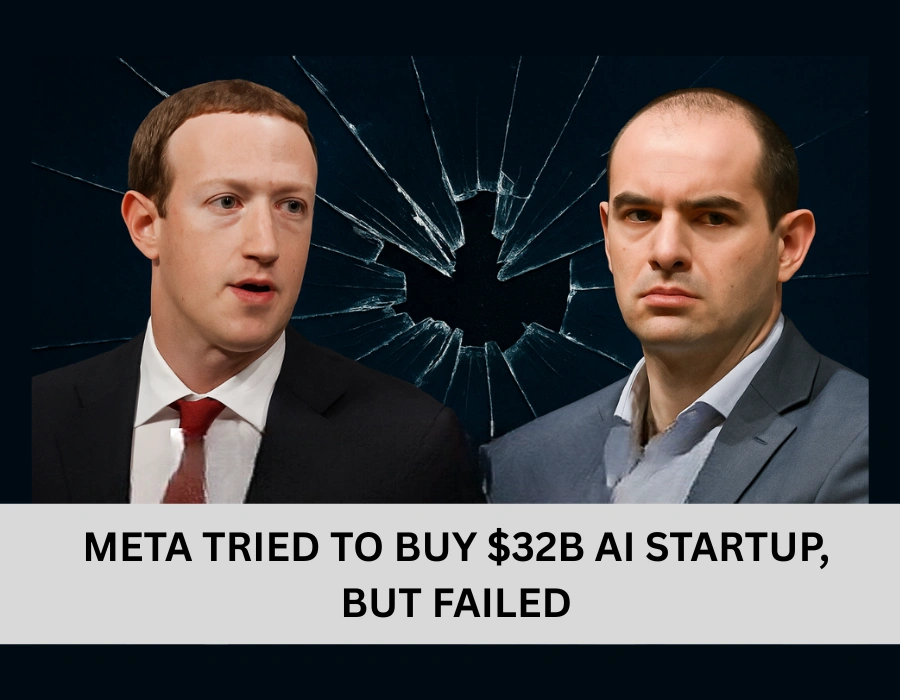Meta’s billion-dollar AI bet just got more personal. After OpenAI co-founder Ilya Sutskever turned down Meta’s acquisition offer for his $32B AI startup, Mark Zuckerberg made a bold pivot—targeting Sutskever’s right-hand man instead.
Key Takeaways :
- Meta tried to buy Safe Superintelligence, a new AI startup from OpenAI co-founder Ilya Sutskever.
- After rejection, Meta moved to hire its CEO, Daniel Gross, and VC partner Nat Friedman.
- Both are joining Meta, and the company is also taking a stake in their venture fund.
- This is part of a broader $14.3B AI hiring spree—including the poaching of Scale AI’s Alexandr Wang.
- Meta, Google, OpenAI, and Microsoft are locked in an escalating global battle for AI dominance.
Meta’s AI Ambitions Take a New Turn
Earlier this year, Meta quietly attempted to buy Safe Superintelligence—a buzzy AI startup founded by OpenAI co-founder Ilya Sutskever. The startup, reportedly valued at $32 billion, had only been in existence for about a year.
But when Sutskever rebuffed Meta’s offer, the story didn’t end there.
Instead, Mark Zuckerberg doubled down. He shifted focus to the startup’s CEO, Daniel Gross, and his long-time business partner, former GitHub CEO Nat Friedman—and successfully persuaded them to join Meta’s growing AI empire.
Who Are Daniel Gross & Nat Friedman?
Gross and Friedman aren’t just tech execs—they’re AI power players.
- Daniel Gross: Founder of Cue (acquired by Apple), former Apple exec, and former YC partner. He co-founded Safe Superintelligence with Sutskever.
- Nat Friedman: Led GitHub after its $7.5B acquisition by Microsoft. Previously co-founded Xamarin and launched multiple AI investments.
- Together, they run NFDG, a venture capital fund backing top AI names like Character.ai, Perplexity, CoreWeave, and Figma.
Sources say Meta will take a stake in NFDG as part of the deal, while both Gross and Friedman will report to Scale AI founder Alexandr Wang, whom Meta recruited last week in a separate $14.3 billion move.
A Billion-Dollar Talent War
Meta’s aggressive moves reflect a broader trend in the AI talent arms race. The major players—Meta, Google, OpenAI, and Microsoft—are all scrambling to build cutting-edge AGI (Artificial General Intelligence) and the LLMs (Large Language Models) that power it.
In just the past year:
- Meta committed $14.3 billion to Scale AI for a 49% stake and top talent.
- OpenAI recruited Apple legend Jony Ive for $6.5B to design AI-first devices.
- Microsoft shelled out $650M to bring on DeepMind co-founder Mustafa Suleyman and his team from Inflection AI.
- Google brought back the founders of Character.ai in a multibillion-dollar retention move.
Even Sam Altman, CEO of OpenAI, weighed in—claiming Meta has offered signing bonuses up to $100M to lure talent away. “None of our best people have taken them up on it,” Altman said on a recent podcast episode.
Zuckerberg’s response? Keep trying—and push harder.
Inside Safe Superintelligence: Why It Matters
Safe Superintelligence isn’t just any AI startup. It’s a venture built by some of the most credible names in artificial intelligence, focused on building next-gen safe and aligned AGI—a direct answer to concerns over unchecked AI development.
While Meta didn’t land the full company, acquiring Gross and Friedman is a strategic coup. Their AI brainpower, investment portfolio, and industry connections give Meta a serious edge as it ramps up its internal efforts.
A Meta spokesperson stated:
“We’ll share more about our superintelligence effort and the great people joining the team in the coming weeks.”
This move is expected to supercharge Meta’s AI roadmap, with Gross and Friedman helping build AI products and research initiatives under Wang’s leadership.
Why This Shift Is Strategic for Meta
When you can’t buy the company, buy the people—and that’s exactly what Meta has done.
By onboarding Gross and Friedman, Meta gains:
- Access to elite AI talent
- Stake in a VC fund with early positions in top AI startups
- Strategic advantage over OpenAI and Google in recruiting future leaders
It’s a human capital play—and a smart one.
Conclusion
Meta’s latest hiring spree isn’t just about filling seats. It’s about shaping the future of AI—one elite mind at a time.
In this increasingly competitive landscape, talent is the real currency, and Zuckerberg is spending freely.
